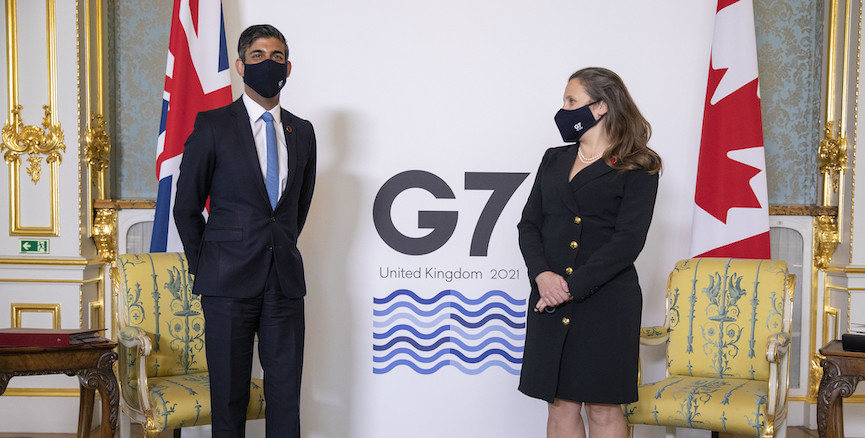Tax dodging by multinational corporations has been going on for decades; it has been under study by governments for just as long.
Instead of paying taxes at the going rate in the country where it conducts the majority of its business, a multinational corporation assigns revenues to low-tax jurisdictions — or tax havens — even if it conducts little to no business there.
A March 2021 study published by the International Centre for Tax and Development (ICTD) estimated that in 2016, multinational corporations shifted US$1 trillion in profits to tax havens.
The upshot is while these globalized companies see their profits expand, countries miss out on important tax revenue — between US$200 and US$300 billion according to the ICTD study.
The low-tax jurisdictions, often hosts to not much more than shell operations, receive marginal benefits, as multinationals would have offices located in the tax havens where they employ administrative support.
Last week’s G7 finance ministers’ meeting in London resulted in the recommendation of the adoption of a global minimum tax on multinational corporations’ profits across jurisdictions at a minimum rate of 15 per cent.
While late in coming, and to be levied at much too low a tax rate, the action is nonetheless welcome.
Before anything can come of the recommendation, it will have to be approved at the G20 meeting in Venice in July, and receive the approval of over 130 nations that have been probing corporate taxation in talks organized by the Paris-based OECD.
The recommendation is being presented as part of the agenda of the new American president. Unlike his predecessor, Joe Biden is being heralded as a proponent of international co-operation.
It is true that Biden wants to lead a broad-based coalition that includes the major Western economies aimed at slowing and containing the rise of China. Building support for the global minimum tax proposal is part of the process of defining the U.S. as a coalition player.
A close look at the proposal suggests that the U.S. have also determined it is to their advantage to back a corporate minimum tax at this time.
European countries, notably France and the U.K. have targeted U.S. tech giants with a digital tax. These taxes, including a projected Canadian tax, will be withdrawn when the U.S. Congress agrees to a plan that would allow for taxes to be levied on 100 major companies, including the tech giants.
The tax on 30 per cent of profits (after the deduction of 10 per cent of profits) is included alongside the 15 per cent minimum tax as a package recommendation.
An important difference is that the minimum tax can be applied without congressional approval. Corporate tax rates are usually set in each jurisdiction by executive authority.
A main stumbling block to the adoption of a corporate minimum tax has been the opposition of low-tax jurisdictions. Without their co-operation it is feared the minimum tax will not be collected.
The current proposal suggests that the home country of multinational corporations will simply impose any minimum tax not collected by a low-tax jurisdiction. This would be an incentive for countries to raise their corporate rates to the 15 per cent level. Otherwise they would miss out on tax revenue generated in their jurisdiction, that was being collected in another country.
The growth of income from intellectual property (IP) rights soared during the COVID-19 pandemic. Multinational corporations have been registering patents, copyrights, software applications and other non-material assets in low-tax rate jurisdictions so as to reduce taxes on profits gained from the monopoly rights associated with intellectual property. These IP rights are protected under international law by conventions of the World Trade Organization.
Profits accumulated by multinational corporations operating in the technological sector or in pharmaceuticals represent a juicy target for countries in need of revenue, as health costs, and income-support payments for low-income families ballooned.
The rise of multinational corporations as the major players in the world economy has long given them leverage in dealing with countries looking for inward investment.
Backed by the U.S. government, and employing armies of lobbyists, multinational corporations crafted the rules for the economic regime popularly known as globalization.
Opening borders to foreign-based enterprises, reductions in barriers to movements of capital, and low taxes have been the main elements driving the expansion of thes globalized companies.
Accepting to pay a minimum tax on their activities may not be much of a burden for multinational corporations if it allows them to continue to dominate the world economy.
Duncan Cameron is president emeritus of rabble.ca and writes a weekly column on politics and current affairs.
Image credit: HM Treasury/Flickr.



